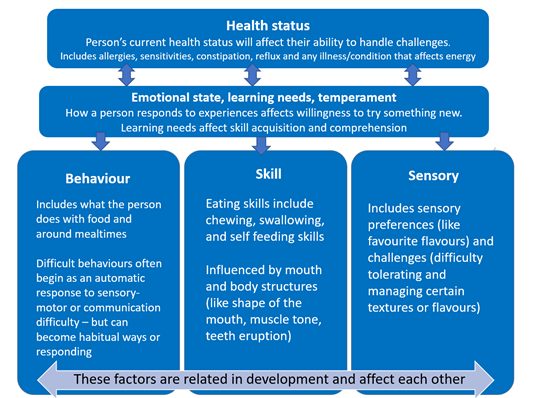Feeding + Swallowing
Individuals with Down syndrome may have difficulties with eating and drinking at various stages in their life. Understanding a person’s unique feeding needs is critical to ensure their safety when eating and drinking. Supporting optimal feeding development throughout a person’s life ensures they are taking in adequate nutrition and hydration to grow and thrive.
Some of the key areas that need to be explored to understand and address a person’s feeding difficulties include:
- Their health status and health history: Issues such as reflux, constipation, food allergies, food sensitivities, and other gastrointestinal issues that are more common in individuals with Down syndrome can all directly lead to difficulties with feeding. Other health issues that affect alertness, the ability to pay attention, or cause pain can also indirectly lead to feeding challenges or complications. A person’s feeding history as a baby can also influence how they learn to eat later in life if they missed the opportunity to eat by mouth due to health complications after birth.
- Emotional state, learning needs, and temperament: How your child responds to mealtime experiences is affected by their temperament and emotional state. In turn, this affects their willingness to try something new and participate in eating and drinking routines. A person’s unique learning needs can affect the way they learn new skills and understand new information.
- Behaviour: This includes what a person does with food and what they do during mealtimes. Difficult behaviours often begin as an automatic response to sensory-motor or communication difficulty, but behaviours can progress and develop into habitual ways of responding.
- Feeding and oral motors skills: Our feeding skills include chewing, swallowing, and how we bring food and drinks to our mouth. These skills can be influenced by mouth and body structures (like shape of the mouth, muscle tone, teeth eruption) that tend to be different in individuals with Down syndrome. People with Down syndrome tend to have more difficulties with oral motor skills, including chewing, drinking, and swallowing.
- Sensory processing: The way a person experiences the different sensations involved in eating affects whether or not they enjoy the food and drink. It can also affect how well a person can manage the food and drink. For example, if a person has reduced sensitivity in their mouth, they might prefer more highly flavoured drinks and foods to help them eat to the best of their ability. This includes sensory preferences (like favourite flavours) and challenges (difficulty tolerating and recognizing certain textures or flavours).

Someone with feeding challenges might need to be followed by a large team of health professionals that can include:
- their family doctor or pediatrician
- a dietician and/or nutritionist
- a speech-language pathologist
- an occupational therapist
Other health professionals that may be involved at different life stages could also include:
- a board-certified lactation consultant,
- a dental professional
- a psychologist
- a board-certified behaviour analyst
- an ear, nose, and throat doctor (ENT or otolaryngologist)
DSRF Resources
Other Resources
Julia’s Way (visit Julia’s Way to download Breastfeeding & Down Syndrome by Ella Gray Cullen)
Oral Motor Difficulties in Down Syndrome by Libby Kumin
